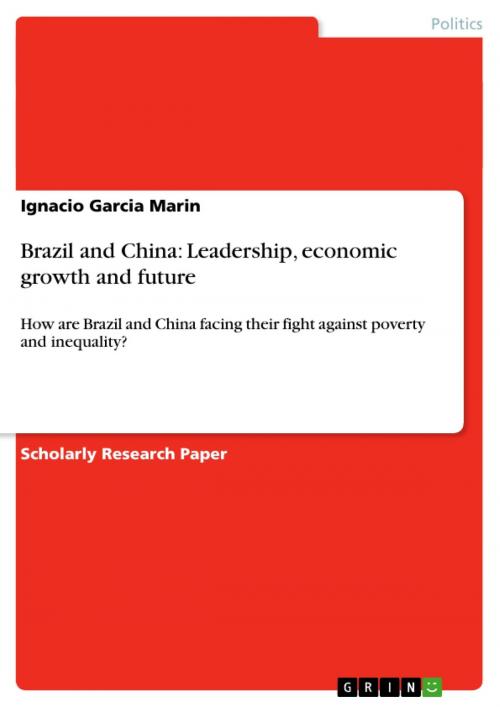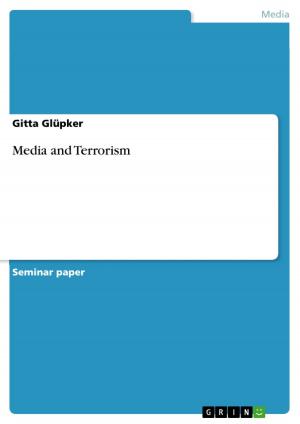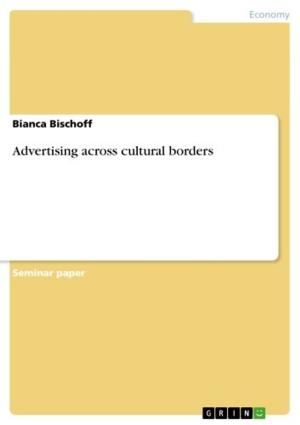Brazil and China: Leadership, economic growth and future
How are Brazil and China facing their fight against poverty and inequality?
Nonfiction, Social & Cultural Studies, Political Science, Government, Public Affairs & Administration| Author: | Ignacio Garcia Marin | ISBN: | 9783656040057 |
| Publisher: | GRIN Publishing | Publication: | October 28, 2011 |
| Imprint: | GRIN Publishing | Language: | English |
| Author: | Ignacio Garcia Marin |
| ISBN: | 9783656040057 |
| Publisher: | GRIN Publishing |
| Publication: | October 28, 2011 |
| Imprint: | GRIN Publishing |
| Language: | English |
Research Paper (undergraduate) from the year 2011 in the subject Politics - International Politics - Region: Other States, grade: 1,3, Humboldt-University of Berlin, course: 2010-2011, language: English, abstract: During the last decade the world has changed. We started the current century with a clear leader: The US, but only a few years later the global arena is very different. Europe and the United States are fighting against a strong economic crisis, and their internal problems do not help to fix it. Besides, there are new regional leaders, like China, Brazil, India, and Russia. I will pay special attention to the first two, particularly their policies against poverty and inequality. The comparison between these countries, in concrete Brazil and China is very interesting, since we can see how different capitalist models are facing evident problems: strong economic growth, millions of poor and corruption. Besides, in the case of China, we are talking about a communist dictatorship with capitalist areas. To begin with I am going to do a short description about the current economic crisis, where I will discuss some ideas considering the different situation between developed and non-developed countries. To analyze the fight against poverty it is important to understand the scenario that surrounds us. Later on I will point out some political questions about the idea that current world is changing the global arena settled after the fall of the USRR. Concluding this section I will introduce to two of the new winners, Brazil and China, and their exclusive club: BRIC with the idea of describe how are these poor countries facing the problem of the poverty. The questions that I am going to answer are How are Brazil and China facing the poverty? What are the priorities of their governments?
Research Paper (undergraduate) from the year 2011 in the subject Politics - International Politics - Region: Other States, grade: 1,3, Humboldt-University of Berlin, course: 2010-2011, language: English, abstract: During the last decade the world has changed. We started the current century with a clear leader: The US, but only a few years later the global arena is very different. Europe and the United States are fighting against a strong economic crisis, and their internal problems do not help to fix it. Besides, there are new regional leaders, like China, Brazil, India, and Russia. I will pay special attention to the first two, particularly their policies against poverty and inequality. The comparison between these countries, in concrete Brazil and China is very interesting, since we can see how different capitalist models are facing evident problems: strong economic growth, millions of poor and corruption. Besides, in the case of China, we are talking about a communist dictatorship with capitalist areas. To begin with I am going to do a short description about the current economic crisis, where I will discuss some ideas considering the different situation between developed and non-developed countries. To analyze the fight against poverty it is important to understand the scenario that surrounds us. Later on I will point out some political questions about the idea that current world is changing the global arena settled after the fall of the USRR. Concluding this section I will introduce to two of the new winners, Brazil and China, and their exclusive club: BRIC with the idea of describe how are these poor countries facing the problem of the poverty. The questions that I am going to answer are How are Brazil and China facing the poverty? What are the priorities of their governments?















